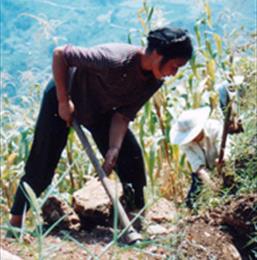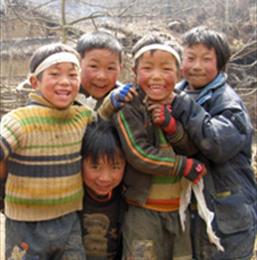Apr/May 2004
31st May 2004
Animal Husbandry Project in Lianghe Township - Baikun Village and Zhongpu village
As an income-generation component in the Kadoorie funded Integrated Community Development Programme, DORS implemented an animal husbandry development-goat project in Baikun and Zhongpu Villages in Ganluo County. DORS agreed to the villagers' request for this project as grazing land is available in the area, the implementation of the 'TGHL' (return of agricultural land to forestry) enables them to get grass seeds subsidy this year, the experience of the villagers in raising goats, and the high goat market value in the region. Knowing this project was broadly feasible, we contacted the local Animal Husbandry Bureau (AHB) to inquire about background information and their experience in goat rearing, new suitable species of goats for the area, and what kind of support they could provide to the villagers. The AHB agreed to provide training and vet services, and to a compensation measure to decrease villagers' risks in raising new species of the goats.
In Baikun Village, the households were divided into groups of 3 to 6 households and DORS donated one improved breed of billy goat to each group who jointly share the ownership, one household from each group is responsible for managing the billy goat. The poor and particularly poor households have also received nanny goats to expand their herd, to thus increase their income in the future.
In Zhonpgu Village, DORS targeted only the particularly poor households and the poor households. After meetings, these two groups decided to do two collective projects. DORS donated a number of billy goats and nanny goats, which are therefore jointly managed.
The villagers were responsible for building goat pens, contributing in a small management fee for the collectively owned goats and to planting grass in their TGHL's plot of land. DORS also facilitated meetings for the villagers to draw up management regulations. A contract was signed with the villagers and the AHB before the purchase of the goats.
In order to save on transportation costs, we brought in the goats for these two villages at the same time from Xichang City with the AHB's assistance. Two villagers accompanied DORS and the AHB to purchase the goats. With the township's assistance, all the villagers received the grass seeds through the AHB from the TGHL' subsidy. Since the beginning of the project, the AHB has held 4 training sessions for the villagers.
DORS brought in 153 goats to two villages. 11 goats died because of the local climate and some related illnesses, some of which will be replaced by the AHB. The remaining goats are healthy. The total project cost in the two villages was 44,008 yuan, and total beneficiaries are 82 households.
Reaching particularly poor villagers
It is a strategic aim of DORS to work with the poorest households in the poorest villages. Our objective is to facilitate the development of local communities in an integrated manner that prioritises those most in need for long term sustainable development.
Review of particularly poor households
During April and May, we visited villages involved in our Kadoorie funded Integrated Rural Development Projects in Ganluo County to review the situation of poor and particularly poor households. The projects carried out in these villagers included: the construction of fuel efficient stoves; the repair of pig sties and cow pens; improved road access and support to raise a newly introduced breed of goat.
The review aimed to assess the participation of those most in need in our projects, and to look at how we might better continue addressing the particular needs of these priority groups. Some key findings are discussed below:
Who are particularly poor households?
Particularly poor households include a range of community members. Some households fall into poverty when family members become ill, injured or die. If able-bodied parents leave the village, households are left with less labour capacity. Some household members may have disabilities, which limit their ability to work and earn a living. Some households are made up of only elderly people, who have difficulty providing for themselves. Particularly poor households are often not only faced with economic pressures, when family members become ill, injured or die, or when relationships break up, households may be faced with great emotional, social and economic strain. With the contract responsibility system, a family with little land has less land to divide up among its children, when those get married, this therefore perpetuates poverty for poor households as the family size changes but the family land remains the same.
Lack of labour capacity
In some cases particularly poor households have limited labour capacity. Many DORS projects require participating villages to contribute labour, and particular poor households may feel they cannot do this. For example, in a sty project, DORS may provide some materials and villagers provide labour to build sties. It may be difficult for particularly poor households to ask other villagers to help. They may be able to afford to provide food and refreshments, as expected, when other villagers assist with providing labour. Other villagers are busy and may not be willing to assist with providing required labour if they receive nothing for this.
Lacking conditions for project participation
Many particularly poor households feel they do not meet the requirements to participate in projects. If, for example, we are supporting villagers to repair sties or build stoves, particularly poor households may feel that their houses are in such a bad state of disrepair that it is not worth making improvements. If their house is in a bad condition, villagers are not prepared to put time, materials and effort into building a stove or sty. When resources are not available to solve underlying problems (e.g., the need to renovate a house), then it is difficult for particularly poor households to productively participate in projects.
What can we do to better meet the needs of particularly poor households?
Even if particularly poor households benefit from integrated projects implemented in their respective villages as a whole, they very often, are still in need of special assistance that can be achieved through projects that are specifically tailored to their individual necessity. In May, DORS started working on a final project component of the Kadoorie funded Integrated Community Development Programme in Ganluo County, which aims to address some of the difficulties faced by particular poor households. Households that are participating in this final stage are those who were identified during the baseline studies as the particularly poor households of those villages and as mentioned above, in April and May, we visited the villages again to re-assess the situation of these households specially. Discussions were held with each household to appraise the project that would best suit their respective situation and means to assist them were identified. For example, where households lack labour capacity, we have planned to work with the community to organise for other villagers to provide labour. In cases where houses are in terrible condition, we will co-operate with villagers to provide necessary materials and they will provide labour.
Meeting project aims - involves negotiating with many villagers - local leaders, particularly poor households and other groups - to ensure that those most in need are supported.
DORS News and Information
Ko Siulan from Kadoorie Charitable Foundation, visited Chalin Village, Wanping Village, Zhongpu Village, Baikun Village and Teke Village during her one-week visit at DORS. KCF has funded the Integrated Community Development Programme for these five villages during the past three years.
The acclaimed Astronomer, Xiong Da-Run, his student Deng Licai and the economist Xu Yao visited Hanyuan County from May 18 to May 21 to see DORS participatory work in action. The team accompanied DORS field staff on village visits and has been able to observe DORS staff facilitating participatory meetings. Professor Xiong has generously offered to make a donation to DORS for the development of participatory projects to promote livelihood development for rural people.
Katie Maher from Australia joined DORS in April. Katie has extensive development work experience in Australia, China and the South East Asian region. Her main role will be co-ordinating the Misereor funded Integrated Rural Development Project. She has lived in China for five years and is fluent in Mandarin Chinese.
Two new trainees joined DORS in April:
Thomas Li, recommended by Misereor, wishes to improve his skills in poverty alleviation and community development in poor rural minority areas. Gillian Tan previously worked with the Trace Foundation in Sichuan and wishes to gain more experience in use of participatory methods.


